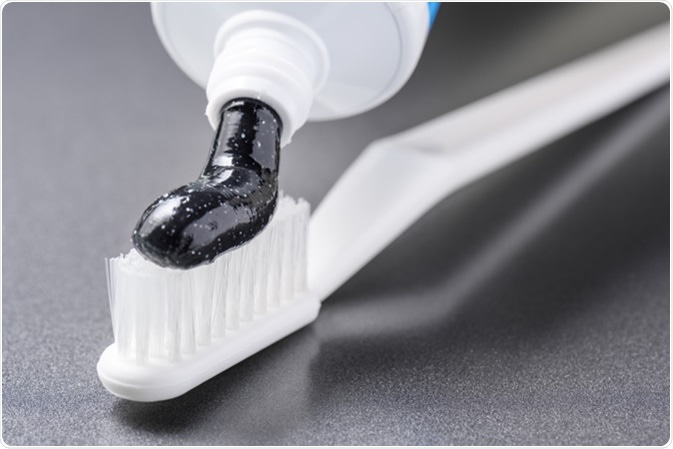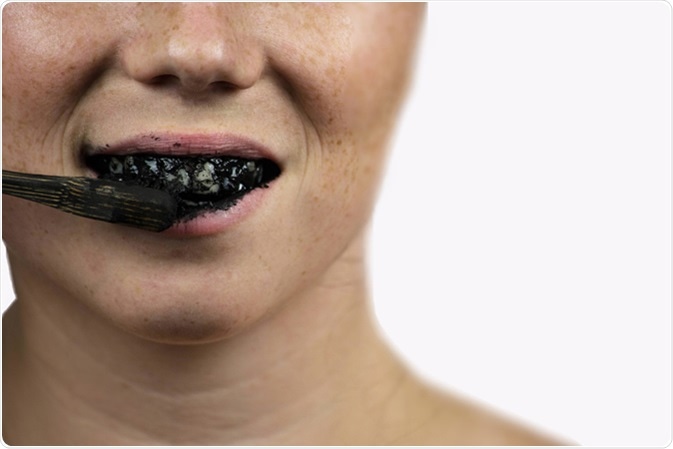The use of charcoal toothpaste is becoming a popular trend in dental care. Its use is associated with oral health benefits; however, it does pose a certain risk of adverse effects on dental health primarily due to its high abrasive properties. Further research is needed to fully explore the benefits of charcoal toothpaste.

Close-up view of black charcoal toothpaste. Image Credit: Efired / Shutterstock
What is Activated Charcoal?
Charcoal toothpaste contains activated charcoal which has increased surface area compared to plain charcoal. This gives it higher adsorptive power, and makes it capable of removing much of the unwanted substances adherent to the tooth surface. This property makes its use more beneficial in comparison to conventional charcoal as a tooth cleansing agent.
How is Activated Charcoal Used in Dentistry?
The use of activated charcoal started during the 20th century and was mostly recommended for tooth whitening purposes only. Activated charcoal is typically derived from the fine carbon powder obtained from burnt coconut shells, olive pits, coal, sawdust or bone char. The charcoal is passed through high heat which activates it by altering the inner structure of the charcoal, thereby making it highly porous. Chemical activation is typically preferred to the above heat processing, being more efficient and rapid.
Activated charcoal is negatively charged, which increases its tendency to attract positively charged molecules towards it, such as tooth stains and plaque. Some observational studies have revealed that activated charcoal exhibits the ability to adsorb accumulated plaque over the tooth surface. Activated charcoal also has an exceptional ability to attract other compounds which are responsible for extrinsic staining of the teeth. This property of removing harmful components is because of the adsorbing nature of activated charcoal.
Oral Health Benefits of Activated Charcoal
Removes superficial stains and makes the teeth appear whiter
Extrinsic stains slowly accumulate on the outermost part of the tooth structure, referred to as enamel. These gradually developing stains are due to certain substances present in caffeine, wine, smoking and some stain-producing foods. These stains affect the overall aesthetic appearance of the teeth. Activated charcoal adsorbs these extrinsic stains and result in increased overall whitening of teeth. However, activated charcoal toothpaste fails to adsorb intrinsic or internal stains. Brushing teeth with charcoal toothpaste should not be regarded as a tooth whitening or bleaching process. The process of chemical tooth whitening works by a different mechanism and can remove internal stains.
Removes accumulated plaque and freshens the breath
Research has revealed that activated charcoal helps to push up the pH level of the oral cavity primarily because it can bind with acidic components. It also results in accelerated removal of acidic compounds from the mouth. Thus activated charcoal helps to remove plaque and results in relieving bad mouth odor, referred to as halitosis.

Black tooth paste with active charcoal. Image Credit: Cerrophoto / Shutterstock
Risks of Charcoal-Based Toothpaste
Recently, the American Dental Association (ADA) has released many warnings against usage of charcoal toothpaste. One prominent warning is based on the known abrasive property of charcoal toothpaste which poses a threat to the outermost covering of the tooth, known as enamel. The high abrasive nature of this toothpaste erodes the enamel, leading to exposure of the inner layer known as dentin. Once the dentin is exposed it leads to dental complications such as tooth sensitivity.
Generally, an effective toothpaste must contain 1350 to 1,500 parts per million (ppm) of fluoride to protect the teeth against decay. Most toothpastes authorized by the ADA contain this fluoride ppm ratio. However, it has been observed that activated charcoal toothpaste lacks the recommended fluoride content, and thereby may pose a risk to dental health.
There is much ongoing research on the safety and effectiveness of activated charcoal-based oral products. Currently, activated charcoal is regarded as hype as far as scientists are concerned, as there is a lack of clinical trials or studies which support the benefits of charcoal toothpaste.
In a nutshell, some risks posed by charcoal toothpastes are:
- Dental erosion: An irreversible loss of the tooth structure may occur with overuse of charcoal toothpaste. Dentin loss increases the risk of dental problems such as accumulation of stains, dental sensitivity due to exposure of dentin, and gingival recession. Its long-term use can result in sensitivity to both hot and cold foods
- Once the dentin is exposed, the risk of caries increases
- Charcoal can also gradually settle in between the gums, leading to other complications like inflammation and trauma to the gums
Further Reading
Last Updated: Jun 17, 2023